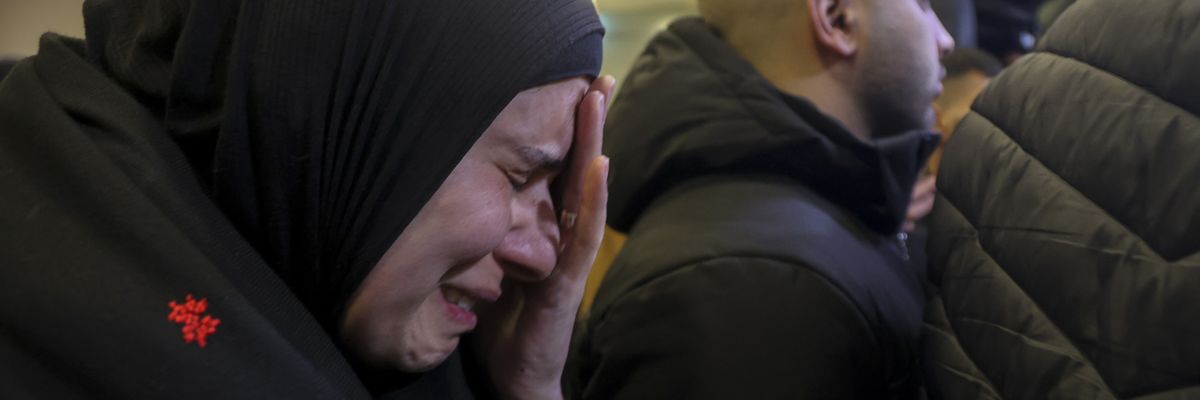The fragile Gaza cease-fire between Israel and Hamas was thrown into uncertainty Sunday after the Israeli government announced it would not immediately move forward with what would have been the largest single-day release of Palestinian prisoners since the truce was agreed to in January.
Israeli Prime Minister Benjamin Netanyahu said Sunday that Israeli forces "are prepared to resume intense fighting at any moment."
"In Gaza, we have eliminated most of Hamas' organized forces, but let there be no doubt, we will complete the war's objectives entirely—whether through negotiation or by other means," he said.
Netanyahu cited what it called "humiliating ceremonies" that Hamas has orchestrated while releasing some of the 25 Israeli hostages who the group has freed since the cease-fire went into effect, when he announced that 620 Palestinian prisoners would not be released as planned.
Nour Odeh, a reporter for Al Jazeera in Amman, Jordan, said the delay was announced "against the recommendation of Israel's security establishment."
Most of the prisoners were detained in Gaza since Israel began bombarding the enclave in October 2023 in retaliation for a Hamas-led attack.
Six Israeli hostages were released Saturday as planned; Hamas has paraded some of the captives on a stage while handing them over in ceremonies that the group has said do "not include any insult to them."
The cease-fire deal does not include stipulations about how prisoners should be released, and some international observers noted that Israel has released Palestinian detainees wearing shirts displaying the Star of David and phrases translated into Arabic that threatened revenge for Hamas attacks on Israel.
In Gaza and the West Bank, Palestinian families who were gathered to welcome their family members home from Israeli prisons learned that Israel was refusing to move forward with freeing prisoners until the future release of more Israeli hostages "has been assured."
"We wait for them, to hug them, and see them, but Netanyahu is always stalling," Fatiha Abu Abdullah, a mother of a detained Palestinian in Khan Younis, Gaza, toldAl Jazeera. "God willing, they will be released soon."
The cease-fire is set to expire in early March unless Israel and Hamas can agree to an extension. In the second phase of the truce agreement, a permanent cease-fire is set to be established and Israeli forces are set to completely withdraw from Gaza.
"By postponing the release of our Palestinian prisoners according to the phase one cease-fire agreement, the enemy government is acting rampantly and exposing the entire agreement to grave danger," senior Hamas official Basem Naim said in a statement, called on the U.S. "to pressure Netanyahu and his government to implement the agreement as it is and immediately release our prisoners."
As the prisoner release was delayed, Israeli warplanes flew at low altitudes over Beirut, Lebanon as thousands of people gathered for the funeral of Hezbollah leader Hassan Nasrallah. Israeli Defense Minister Israel Katz said the army planes were deployed to send "a clear message: Whoever threatens to destroy Israel and attacks Israel—that will be the end of him."
Ramy Abdul, chairman of Euro-Med Human Rights Monitor, called the delayed prisoner release along with the deployment of warplanes "childish, theatrical stunts by a shaken entity that sees no future for itself in this region."
The government media office in Gaza this week reported that Israel has violated the cease-fire agreement more than 350 times since it was established in mid-January, killing at least 92 Palestinians and injuring at least 822 more in direct attacks.
Meanwhile, Katz said Sunday that Israeli troops will remain in the West Bank for "the coming year" as tanks moved into the territory for the first time since 2002.
The United Nations has confirmed that about 40,000 Palestinians have been forcibly displaced from refugee camps in the West Bank, with Israel pushing to further its goal of achieving what Al Jazeeracalled a "demographic shift" in the territory.
Jewish settlers have carried out violent attacks across the West Bank since the Gaza cease-fire was reached, and as Common Dreams reported last week, Israeli officials have moved to expand a Jewish-only settlement in the West Bank by nearly 1,000 homes.
"If we look at history in 1948 and 1967, immediately after the war Israel tried to change Palestinian demography to seize maximum territory—it's doing the same now," Menachem Klein, a professor of political science at Bar-Ilan University in Israel, toldAl Jazeera. "There is a war and Israel tries to gain some demographic and geographic achievements to further base Jewish supremacy in the region."

